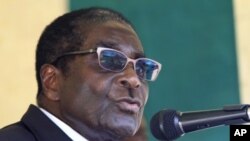Zimbabwe's President Robert Mugabe has marked his 88th birthday with a series of interviews in which he insists he will call for elections this year.
However, analysts say it is unlikely he will defy regional leaders who insist that a new constitution, endorsed in a referendum, be in place before elections are held.
Mugabe told Zimbabwe state television that he will do whatever it takes to ensure that they are held.
"But definitely I will then exercise my presidential powers in accordance with the main constitution, the principal constitution of the country, and announce when the election will take place," he said. "And I will do this."
Photo Gallery - Robert Mugabe Through the Years
But in order to do this, Mugabe will have to withdraw from the 2008 Global Political Agreement, or GPA, which brought about the power-sharing government in his country. The agreement was backed by the Southern African Development Community, the SADC.
"We will tell SADC what the problem is, and SADC cannot compel us to continue on an exercise which is futile," he said. "And I am sure that there is greater wisdom on the part of SADC, and anyway the GPA states that a party can resign from it, reject it completely, and once a rejection takes [place], we revert then to our existing constitution. A constitution on which all these years we have based ourselves, and that becomes also the basis of an election."
Ibbo Mandaza, an author and a founder of SAPES Trust, a regional think tank, said rather than winning the support of the SADC and the African Union, Mugabe is likely to incur their wrath if he unilaterally calls for an election. Their patience with the aging leader, he said, is wearing thin.
"The SADC and the AU are getting increasingly impatient with Mugabe, and he should know that many feel he has overstayed," said Mandaza. "Many feel that this is mainly his problem that has led to the GPA, and that he of all people should not be seen to be in the way of a process towards the recovery of Zimbabwe."
The SADC appointed South African President Jacob Zuma as facilitator for the Zimbabwean transition. He has won SADC and AU support for a so-called Zimbabwe roadmap that requires full implementation of the 2008 political agreement, including adoption of a new constitution endorsed by Zimbabweans in a referendum.
Watch video of Mugabe, staff celebrating
The new constitution was supposed to be in place a year ago, but there have been many delays in the process, and a draft is only now expected within the next couple of months. Mandaza says that once that is done, there are further time-consuming processes that must be adhered to.
"Another three months before [the meeting of political parties, and civil society groups] is held, and if things go well, it will be maybe October-November before a referendum is held," he said. "And then three months thereafter, parliament accedes to the new constitution assuming the referendum is positive. So by any accounts, we are talking about 2013 at the earliest -- others will say 2014-2016."
Mandaza is referring to a view of some Zimbabweans that rather than elections, the current term of the unity government be extended beyond 2013, and that a new, more refined political agreement, at present called GPA-2, be put in place. The goal is to create a socially, politically and economically stable environment in which credible elections can be held.
The last elections in 2008 were so plagued by violence -- most of it perpetrated by Mugabe's supporters -- that observers declared the presidential vote a sham and pressured the president into the current inclusive government.
